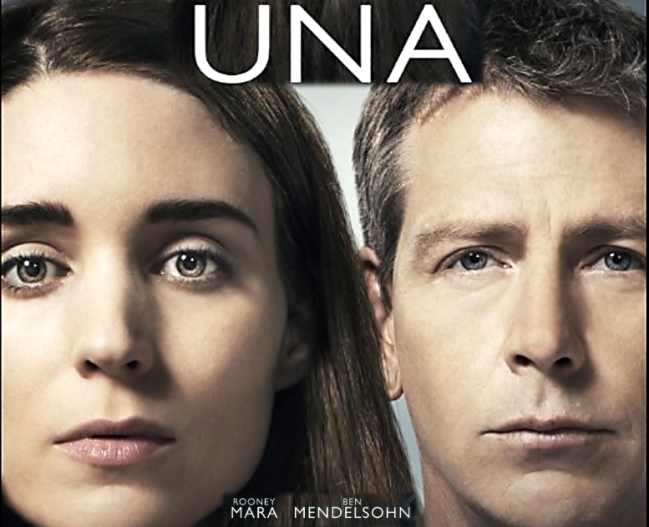 June
26
June
26
Tags
Una (2016)

Conventional genre movies work their magic almost entirely through manipulating stereotypes. But many powerful movies work in reverse: they deconstruct stereotypes to challenge our boundary perceptions. Themes like feminism, racism and nationalism, are regularly pulled apart to see what makes them tick. In recent years, child sexual abuse has been in the spotlight and it is overwhelmingly treated as a moral absolute. However, the film Una (2016) challenges the norm by exploring ambivalences in a case of blatant abuse. In doing so, it places the audience squarely on the judge’s bench.
Adapted from the acclaimed 2005 stage play Blackbird, this tense drama-thriller explores the moral ambiguities of a criminal act that occurred 15 years ago between 40-year old Ray (Ben Mendelsohn) and 13-year old Una (Mara Rooney). The emotionally immature Ray was obsessed with the lonely and precocious Una over a three-month relationship before having ‘consensual’ sex with her. By chance, the incident was discovered and he spent four years in jail. Since then he changed his name and has tried to restore his life. Meanwhile Una’s world spiralled into an emotional void. Now 28, she has tracked him down and unexpectedly confronts him at the factory where he works. Instead of attacking him for the abuse, she demands to know why he abandoned her after their one night together. They continue talking beyond the factory’s closing time, then she tricks another employee to take her to Ray’s home where his girlfriend is hosting a party. At this point, the intensity of the factory scenes becomes diluted and the sparring inconclusive.
This is an explosive mix of issues, personality and circumstance. The film consists mostly of their verbal sparring about the illegal ‘affair’ with dialogue ranging from hysterical, passionate to icy cool within an industrial setting that is claustrophobic and alienating. It is beyond Ray’s emotional capacity to understand what Una wants, while she vacillates between wanting to restore her juvenile obsession with him and wanting to see him wallow in guilt for his crime. Every time we feel contempt for him, we see a piece of the emotional puzzle indicating human weakness but not evil. Every time we admire Una’s determination to hold Ray to account, we see a glimpse of her complicity and manipulation. Mara Rooney and Ben Mendelsohn fill their characters with confusion and remorse. At the same time, they depict genuine emotional connection with each other despite the legal, emotional and moral prohibitions that still frame their lives. Their performances are brilliant.
At one level, this film is about the horrendous impact on victims and the abrogation of responsibility that occurs in cases of child sexual abuse. At another, it pulls apart the stereotype of victim and abuser to shed light on how it can happen and its painful aftermath. Some audiences may be repulsed at the level of sympathy shown to the perpetrator and the implicit sharing of responsibility between a juvenile and an adult for what is entirely an adult crime. Others may be shaken by the idea that such crimes may have any moral ambiguity at all. In any case, this is brave and provocative cinema that cuts across the guilt versus innocence binary.

Director: Benedict Andrews
Stars: Ben Mendelsohn, Mara Rooney
A UK, USA, Canada production

Thanks for the review!
LikeLiked by 1 person
Oh this one sounds amazing. I’ve often pondered that line between sexual abuse and the power that is sometimes (NOT ALWAYS) handed to young girls to accuse an adult of abuse. I’m sure that there are false accusations that end up with the offender in jail, life ruined. And of course there are far too many of the opposite scenarios in which young girls/women are raped and the crime goes unreported or is dismissed. I realize this film does not address exactly that scenario, but it does explore the Lolita pattern which is endlessly fascinating from a psychological aspect.
LikeLiked by 1 person
Interesting observations. I like the way this un-plucks the standard stereotypes of guilt and innocence. Once you cross that boundary, the process can be applied to many aspects of sexual relations.
LikeLike
And it all gets very confusing. Therein, interesting.
LikeLiked by 1 person
Hm, I found the movie unequivocally about a sexual predator and his young victim, which is why I find comments like those by “rangewriter” so disturbing and upsetting.
LikeLiked by 1 person
I agree with you (and I’m sure rangewriter agrees) that this movie is “unequivocally about a sexual predator and his young victim”. The movie forensically explores the moral ambivalence of those labels without conclusively judging either party. I read rangewriter’s comments as reflections on this ambivalence. Despite society’s abhorrance of the events depicted, the movie makes us question moral absolutes as courtroom judges must do every day. Thanks for sharing your thoughts here.
LikeLike